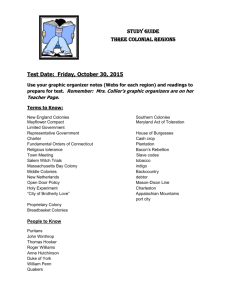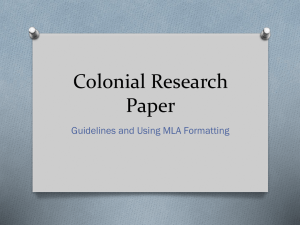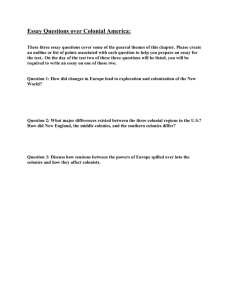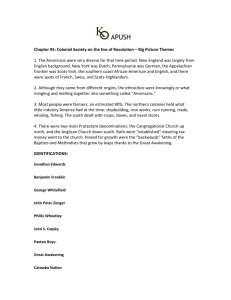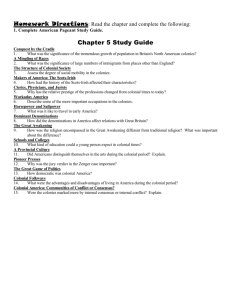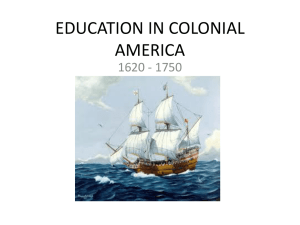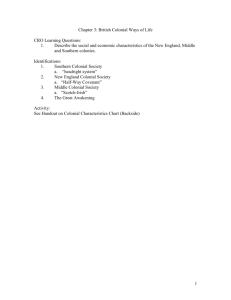Pag Q Ch. 2
advertisement
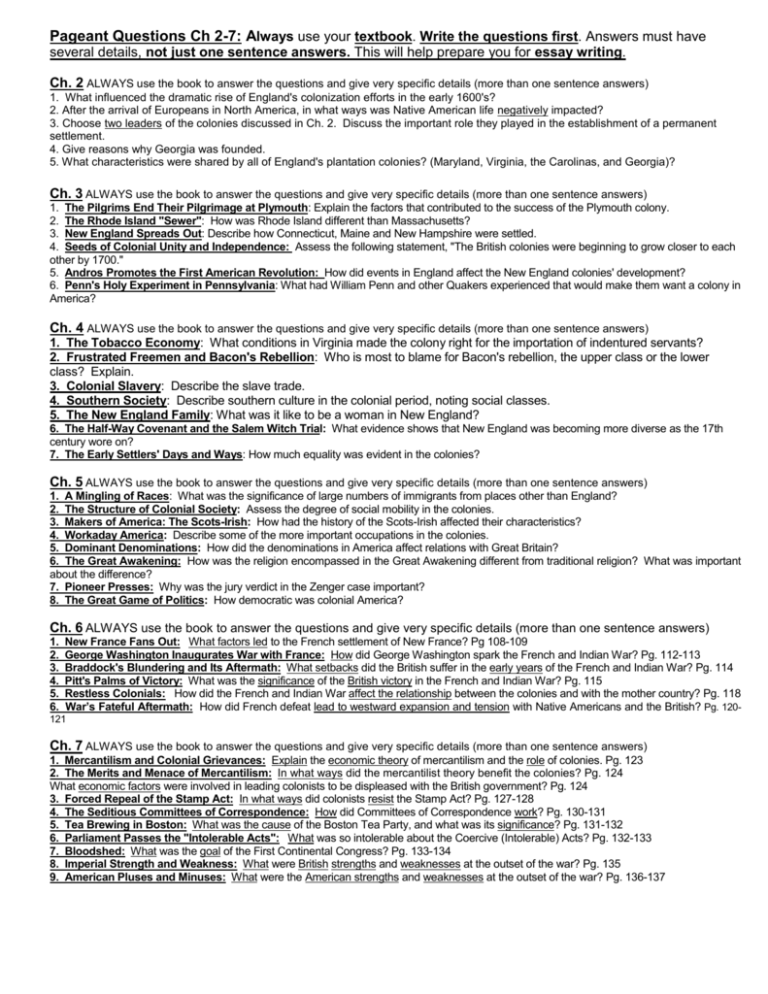
Pageant Questions Ch 2-7: Always use your textbook. Write the questions first. Answers must have several details, not just one sentence answers. This will help prepare you for essay writing. Ch. 2 ALWAYS use the book to answer the questions and give very specific details (more than one sentence answers) 1. What influenced the dramatic rise of England's colonization efforts in the early 1600's? 2. After the arrival of Europeans in North America, in what ways was Native American life negatively impacted? 3. Choose two leaders of the colonies discussed in Ch. 2. Discuss the important role they played in the establishment of a permanent settlement. 4. Give reasons why Georgia was founded. 5. What characteristics were shared by all of England's plantation colonies? (Maryland, Virginia, the Carolinas, and Georgia)? Ch. 3 ALWAYS use the book to answer the questions and give very specific details (more than one sentence answers) 1. The Pilgrims End Their Pilgrimage at Plymouth: Explain the factors that contributed to the success of the Plymouth colony. 2. The Rhode Island "Sewer": How was Rhode Island different than Massachusetts? 3. New England Spreads Out: Describe how Connecticut, Maine and New Hampshire were settled. 4. Seeds of Colonial Unity and Independence: Assess the following statement, "The British colonies were beginning to grow closer to each other by 1700." 5. Andros Promotes the First American Revolution: How did events in England affect the New England colonies' development? 6. Penn's Holy Experiment in Pennsylvania: What had William Penn and other Quakers experienced that would make them want a colony in America? Ch. 4 ALWAYS use the book to answer the questions and give very specific details (more than one sentence answers) 1. The Tobacco Economy: What conditions in Virginia made the colony right for the importation of indentured servants? 2. Frustrated Freemen and Bacon's Rebellion: Who is most to blame for Bacon's rebellion, the upper class or the lower class? Explain. 3. Colonial Slavery: Describe the slave trade. 4. Southern Society: Describe southern culture in the colonial period, noting social classes. 5. The New England Family: What was it like to be a woman in New England? 6. The Half-Way Covenant and the Salem Witch Trial: What evidence shows that New England was becoming more diverse as the 17th century wore on? 7. The Early Settlers' Days and Ways: How much equality was evident in the colonies? Ch. 5 ALWAYS use the book to answer the questions and give very specific details (more than one sentence answers) 1. A Mingling of Races: What was the significance of large numbers of immigrants from places other than England? 2. The Structure of Colonial Society: Assess the degree of social mobility in the colonies. 3. Makers of America: The Scots-Irish: How had the history of the Scots-Irish affected their characteristics? 4. Workaday America: Describe some of the more important occupations in the colonies. 5. Dominant Denominations: How did the denominations in America affect relations with Great Britain? 6. The Great Awakening: How was the religion encompassed in the Great Awakening different from traditional religion? What was important about the difference? 7. Pioneer Presses: Why was the jury verdict in the Zenger case important? 8. The Great Game of Politics: How democratic was colonial America? Ch. 6 ALWAYS use the book to answer the questions and give very specific details (more than one sentence answers) 1. 2. 3. 4. 5. 6. New France Fans Out: What factors led to the French settlement of New France? Pg 108-109 George Washington Inaugurates War with France: How did George Washington spark the French and Indian War? Pg. 112-113 Braddock's Blundering and Its Aftermath: What setbacks did the British suffer in the early years of the French and Indian War? Pg. 114 Pitt's Palms of Victory: What was the significance of the British victory in the French and Indian War? Pg. 115 Restless Colonials: How did the French and Indian War affect the relationship between the colonies and with the mother country? Pg. 118 War’s Fateful Aftermath: How did French defeat lead to westward expansion and tension with Native Americans and the British? Pg. 120- 121 Ch. 7 ALWAYS use the book to answer the questions and give very specific details (more than one sentence answers) 1. Mercantilism and Colonial Grievances: Explain the economic theory of mercantilism and the role of colonies. Pg. 123 2. The Merits and Menace of Mercantilism: In what ways did the mercantilist theory benefit the colonies? Pg. 124 What economic factors were involved in leading colonists to be displeased with the British government? Pg. 124 3. Forced Repeal of the Stamp Act: In what ways did colonists resist the Stamp Act? Pg. 127-128 4. The Seditious Committees of Correspondence: How did Committees of Correspondence work? Pg. 130-131 5. Tea Brewing in Boston: What was the cause of the Boston Tea Party, and what was its significance? Pg. 131-132 6. Parliament Passes the "Intolerable Acts": What was so intolerable about the Coercive (Intolerable) Acts? Pg. 132-133 7. Bloodshed: What was the goal of the First Continental Congress? Pg. 133-134 8. Imperial Strength and Weakness: What were British strengths and weaknesses at the outset of the war? Pg. 135 9. American Pluses and Minuses: What were the American strengths and weaknesses at the outset of the war? Pg. 136-137



